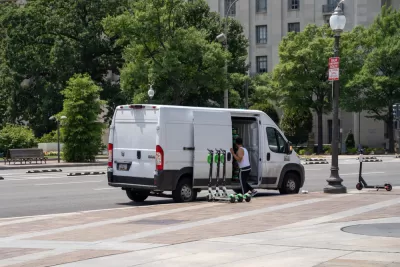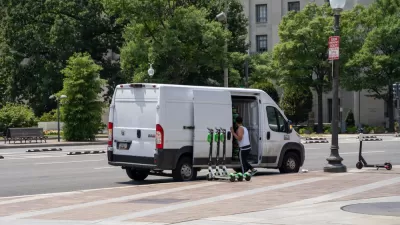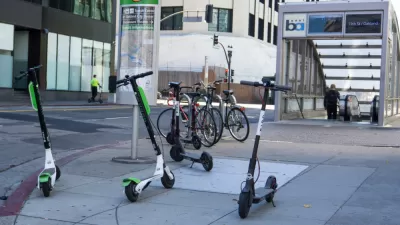Although electric scooter rental companies won't confirm the reasoning behind price increases for scooter rides in the Washington, D.C. region, it's likely the same story will be repeated in other regions as well.

Luz Lazo reports on a new era in the still very young history of electric scooter rentals:
Scooter companies operating in the Washington region have raised their rental prices, dropping the introductory 15-cents-per-minute rides that were widely appealing in exchange for per-minute charges that range from 24 cents to 39 cents, depending on the company. That’s in addition to the $1 unlocking fee some charge. Experts predict prices may go even higher as companies face more fees from cities and increasing pressure to turn a profit.
According to Lazo, all of the scooter rentals companies operating in the District offer programs to discount the costs of rides for low-income users.
"But some riders say the new prices can be comparable to taking Uber Pool and much higher than taking the bus, which costs $2. A 20-minute ride on Bird runs nearly $8.80, plus tax; the same ride is $5, plus tax, on a Jump scooter, the cheapest option," according to Lazo.
Experts cited in the article say the increasing prices are unsurprising given the costs imposed by regulations designed to mitigate the negative effects of the sudden proliferation of electric scooters in the public realm.
FULL STORY: That scooter ride is going to cost you a lot more

Planetizen Federal Action Tracker
A weekly monitor of how Trump’s orders and actions are impacting planners and planning in America.

Chicago’s Ghost Rails
Just beneath the surface of the modern city lie the remnants of its expansive early 20th-century streetcar system.

San Antonio and Austin are Fusing Into one Massive Megaregion
The region spanning the two central Texas cities is growing fast, posing challenges for local infrastructure and water supplies.

Since Zion's Shuttles Went Electric “The Smog is Gone”
Visitors to Zion National Park can enjoy the canyon via the nation’s first fully electric park shuttle system.

Trump Distributing DOT Safety Funds at 1/10 Rate of Biden
Funds for Safe Streets and other transportation safety and equity programs are being held up by administrative reviews and conflicts with the Trump administration’s priorities.

German Cities Subsidize Taxis for Women Amid Wave of Violence
Free or low-cost taxi rides can help women navigate cities more safely, but critics say the programs don't address the root causes of violence against women.
Urban Design for Planners 1: Software Tools
This six-course series explores essential urban design concepts using open source software and equips planners with the tools they need to participate fully in the urban design process.
Planning for Universal Design
Learn the tools for implementing Universal Design in planning regulations.
planning NEXT
Appalachian Highlands Housing Partners
Mpact (founded as Rail~Volution)
City of Camden Redevelopment Agency
City of Astoria
City of Portland
City of Laramie





























